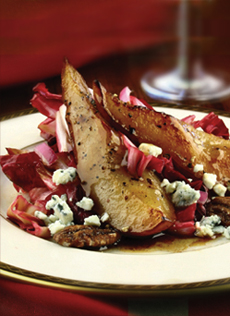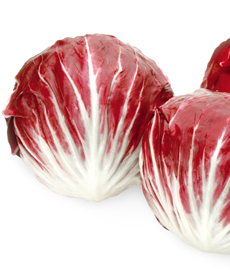
If you enjoy blue cheese, enjoy it in a pear salad. Buy a good piece of blue cheese. The prepackaged “crumbles” are lower quality and typically salty. Photo courtesy Royal Rose Radicchio.
February 2011
|
 |
Product Reviews / Main Nibbles / Vegetables
Recipe: Pear Salad With Blue Cheese, Radicchio & White Balsamic Vinegar
A Beautiful Salad For Fall & Winter
Jump to the recipe
Introduction: What Is White Balsamic Vinegar?
We love a salad that combines salad greens with fresh fruit and a bit of cheese. This recipe also uses white balsamic vinegar. Which begs the question: If balsamic vinegar is dark, thick and complex, white is “white” balsamic?
While conventional balsamic is about 1,000 years old, white balsamic vinegar made its appearance more recently. It is merely a sweetened white wine vinegar, created by industry to give a cachet (and higher price) to white wine vinegar. Its relationship to authentic balsamic vinegar is that both include Trebbiano grapes. Authentic balsamic also uses Lambrusco and often other varietals like Spergola, for complexity.
White balsamic vinegar is not approved by the Consorzio Balsamico, the trade association that certifies authentic balsamic vinegar. It was invented to provide a white vinegar with lower acidity and greater sweetness that is required with light-colored foods, when the color a white sauces or food would be adversely affected by the dark brown color of traditional balsamic.
- White balsamic vinegar, which is light-bodied and slightly sweet in flavor, is made from white wine vinegar made from Trebbiano grapes, plus white grape must (unfermented juice pressed from wine grapes). As with traditional balsamic, white balsamic is aged; but not for eight years or longer in a series of specialty woods. If a recipe calls for white balsamic and you don’t have it, you can sweeten regular white vinegar with a bit of sugar or agave nectar.
- Traditional balsamic vinegar is made with the must of red grapes. Unlike other vinegars, balsamic does not come from wine, but from grape juice that has never been allowed to ferment into wine. It is heavy, rich and caramelized—delicious to drink from a spoon. While there are a lot of “factory vinegars,” Consorzio-approved balsamic has extremely rigorous standards. Inexpensive “balsamics” are faked by adding caramel flavoring and color to ordinary red vinegar.
And now, onto the recipe!
Pear Salad Recipe
Serves 4 to 6 as a salad course.
Ingredients
- 2 ripe but firm Bosc pears, cored and
quartered
- 1 head radicchio, cored, halved and
sliced
- 2 tablespoons olive oil, divided
- 1/2 teaspoon salt
- 3 tablespoons extra virgin olive oil
- 3 tablespoons white balsamic vinegar
- 1/4 teaspoon freshly ground black
pepper
- 1/2 cup red onion, thinly sliced
- 4 ounces crumbled blue cheese
- 4 tablespoons roasted sugared nuts,
such as honey-roasted almonds,
coarsely chopped
- Freshly ground black pepper
|
|

Radicchio can be found in round heads like the ones above, in long heads the shape of romaine, and other forms. Photo courtesy Royal Rose Radicchio. |
Preparation
-
Heat oven to 425°F. Toss pears with 1 tablespoon oil and spread evenly on rimmed baking sheet. Roast for 15 minutes, stirring to keep from sticking.
-
Toss radicchio with another tablespoon of oil and salt; add to pan with pears and continue roasting for 8 minutes, until pears are slightly browned and radicchio is tender.
-
Meanwhile, in small skillet, warm together the remaining 3 tablespoons oil, vinegar and pepper.
-
Remove radicchio and pears to a large shallow bowl; toss with warm dressing and red onion. Serve immediately on salad plates, garnished with cheese, nuts and pepper.
Recipe © Copyright Royal Rose Radicchio. Other material
Lifestyle Direct, Inc. All rights reserved. Images are the copyright of their respective owners.

|



